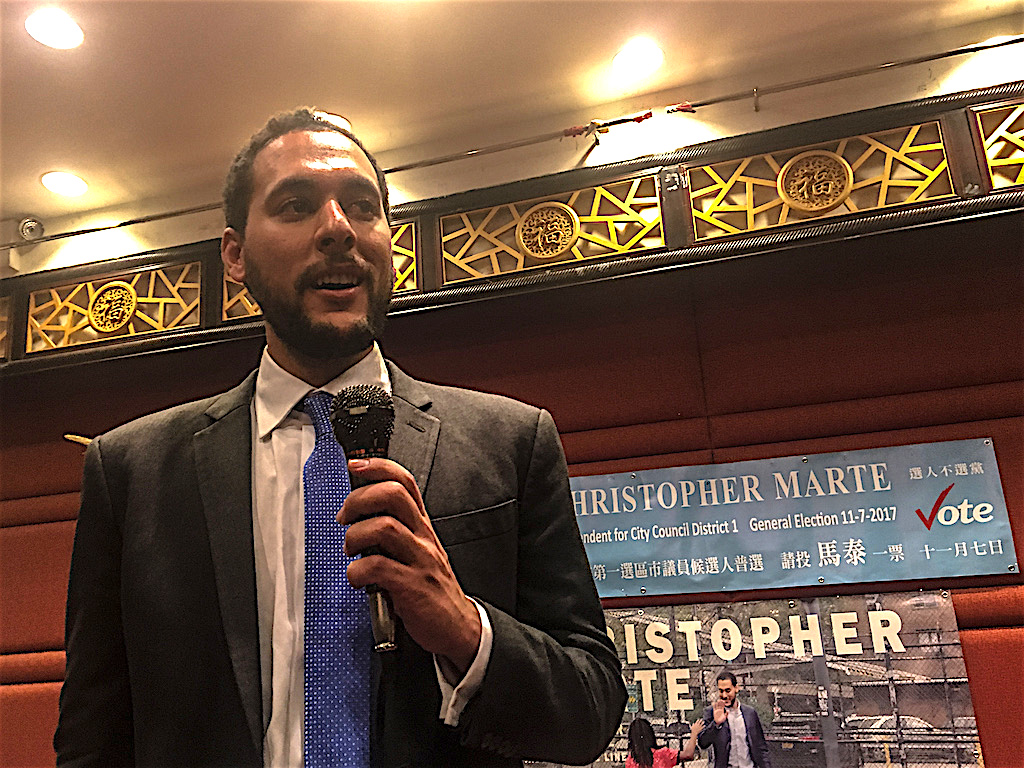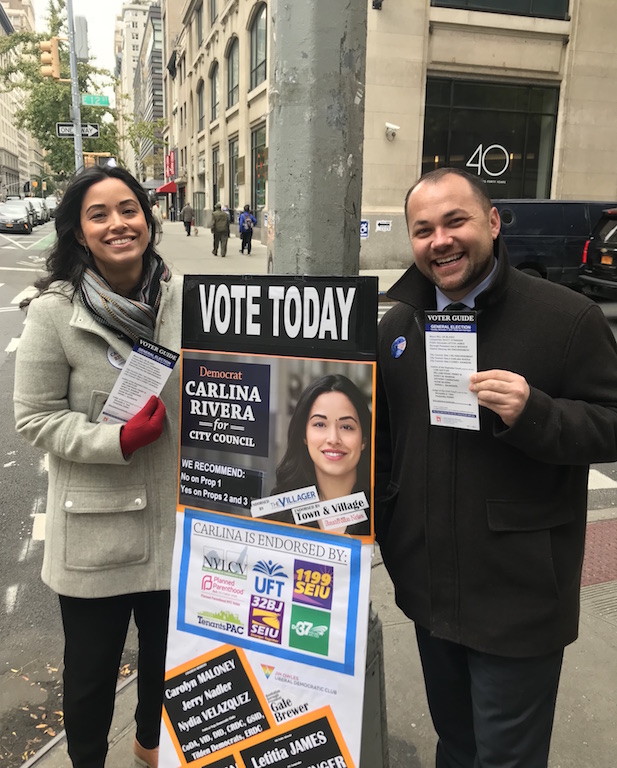
BY LINCOLN ANDERSON | Updated, Thurs., Nov. 8, 12 a.m.: In the end, it looks like the Sept. 12 Democratic primary election was clearly Christopher Marte’s best chance to unseat Margaret Chin in Lower Manhattan’s First City Council District.
Marte lost that race two months ago by a very slim margin, 220 votes, to the two-term incumbent Chin. Two other candidates ultimately played the role of spoilers, likely keeping Marte from a historic upset victory.
Marte gave it another try in Tuesday’s general election, running on the obscure Independence Party line. But the results weren’t nearly as close, as Chin, according to unofficial Board of Elections results, won with nearly 50 percent of the vote, with 99 percent of the tally from poll-site scanners reported.
“Generally, in New York City, the elections are decided in the primary,” Hank Sheinkopf presciently told The Villager a month ago, after Marte announced he would run in the general. “It’s not impossible, but don’t hock the house, don’t bet the farm,” the longtime political consultant said of the chances of third-party candidates winning in heavily Democratic districts like District 1.
While the two other primary candidates — Aaron Foldenauer and Dashia Imperiale — took 10 percent of the votes on Sept. 12, votes that might well have gone to Marte, this time there was also a Republican in the race. Chin also had a second ballot line, the Working Families Party line, and Foldenauer was running yet again, this time as the Liberal Party candidate.
This time, instead of losing by 222 votes, Marte lost by nearly 3,000.
As of Tuesday night at 11 p.m., Chin had 11,468 votes (49.8 percent of the total), Marte had 8,502 (36.92 percent), Republican Bryan Jung had 2,014 votes (8.75 percent), Foldenauer had netted 1,013 (4.4 percent) and there were 30 write-in names (less than 1 percent).
Chin’s total included 10,572 votes on the Democratic line, plus 896 on the Working Families line.
‘Voters have spoken’
In a statement Tuesday night, the victorious Chin said, “Lower Manhattan voters have spoken and they have made it clear that they support the record we have achieved and the vision we have fought for: Building more affordable housing, securing millions for senior services, schools and parks, strengthening Downtown’s resiliency and fighting for our shared progressive values. I am so proud to have the support of the thousands of Lower Manhattan voters who showed up to the polls. I am sincerely humbled and I look forward to the next four years on the Council where I will continue the great progress we have made as a community.”
Creating a reason for Marte’s candidacy, Chin faced a backlash, among other things, over her support for an affordable-housing project on the Elizabeth St. Garden, as well as not doing enough to stop the mushrooming of “supertall” towers on the Lower East Side waterfront or the N.Y.U. expansion plan in the South Village. In general, she has been seen as too often not being on the same page with constituents in the northern part of her district, in particular.

Marte, meanwhile, held his election night party at Jing Fong dim sum restaurant, on Elizabeth St., in Chinatown, where he gave what was described as a very emotional speech.
Built on primary
Speaking the next day, Marte told The Villager he and his team knew that this race would be tougher than the primary.
“We did really well,” he said. “We got a little bit more than 8,500 votes — which was 3,000 more than we got in the primary. It showed that people stayed with us, believed in our vision, and wanted change for Lower Manhattan. Being on a third-party line that’s not known, running against an incumbent on the Democratic and Working Families lines is a big hurdle to overcome. We saw that we could gather support, grow support and have a competitive election.
‘Something special’
“We were able to create something really special — from Chinatown to Tribeca, the Lower East Side to Greenwich Village — and create this grassroots campaign, and it’s not going away. We’re going to use this to keep on taking on the issues. The issues are still time-sensitive and they are still there.”
Marte said he plans to keep fighting on “overdevelopment, lack of community engagement and lack of transparency.”
As for locations he did well in the election, he said they are still analyzing the data, but he noted he did win the P.S. 2 poll site, at Henry and Pike Sts., which has a heavy Chinatown population.
“That was unexpected,” he said, adding that overdevelopment in the Two Bridges area was a big concern there.
Speaking by phone shortly before 10 p.m. Tuesday night, David Gruber, who was an informal campaign adviser — part of what he dubbed Marte’s “kitchen cabinet” — said Marte had just wrapped up his concession speech.
“It was a very emotional speech,” Gruber said. “He said that what he did in the primary election got the attention of the whole city.”
Fury at ‘spoilers’
Gruber was still furious at Foldenauer and Imperiale for ultimately having kept Marte from winning the primary.
“I’m so angry at those spoilers — [who were running] with no purpose,” he said, “just ego.”
As for Marte, 28, he said, “He’s a young guy. He has a bright future ahead of him.”
Describing the scene at Jing Fong, Gruber, a former chairperson of Community Board 2, said neighborhood activists — many from the Village and Soho / Little Italy parts of the district — were there commiserating with each other.
“We all know each other,” he said. “We’ve worked together for years.”
In the Second City Council District, covering the East Village and stretching from the Lower East Side up to the E. 30s, Democratic candidate Carlina Rivera won handily.

Rivera romps
With 99 percent of the scanners reported, Rivera won a total of 83 percent of the vote, running on the combined Democratic and Working Families lines. Jimmy McMillan took about 12 percent of the total on two ballot lines — G.O.P. and Rent Is 2 Damn High — while Jasmine Sanchez got about 2 percent as the Liberal Party candidate, and a Libertarian and a Green candidate each garnered less than 2 percent.
Rivera will succeed Rosie Mendez, who will be term-limited at the end of this year after three terms in office.
Johnson skates
In City Council District 3, covering the Village, Chelsea and Hell’s Kitchen, Democrat Corey Johnson overwhelmingly won re-election to a second term, with 94 percent of the vote. His sole opponent, Occupy Wall Street activist / Sky Rink skating instructor Marni Halasa, on the Eco Justice Party line, got 6 percent. Johnson is considered a leading candidate to be elected speaker of the City Council at the start of the new year.
In a statement, Johnson said, “I want to thank the people of District 3 for entrusting me with a second term as your councilmember. The challenges we face are incredibly complex and entrenched, but the future of our city depends on our ability to address them. An affordable housing crisis, small businesses in crisis, historic income inequality, a homelessness crisis, aging infrastructure and obsolete public transportation are just a few of the issues we must address. I believe that we can fulfill the great promise of our city and ensure that our neighborhoods are affordable, diverse, safe and full of life. With your partnership, we will prevail.”
De Blasio cruises
As expected, Mayor Bill de Blasio won re-election, with 66 percent of the vote. Republican candidate Nicole Malliotakis ran pretty strongly, though, with 28 percent. Sal Albanese, on the Reform Party line, with lots of integrity but not enough cash, barely cracked the 2 percent mark, and a number of other candidates got around 1 percent.
Democrats Comptroller Scott Stringer, Public Advocate Letitia James and Manhattan Borough President Gale Brewer all comfortably coasted to re-election.
Facing no candidates on party ballot lines, Manhattan District Attorney Cy Vance won re-election with about 91 percent of ballots cast. The rest of the votes were write-ins, presumably mostly for former Brooklyn prosecutor Marc Fliedner, who announced his write-in candidacy after news broke about Harvey Weinstein’s history as a serial sex abuser — and the revelation of Vance’s failure to prosecute the movie mogul for sexually assaulting an actress in Tribeca. Tribeca attorney Pete Gleason, a member of the Downtown Independent Democrats club, also mounted a write-in candidacy for D.A., but at the last minute, threw his support behind Fliedner, to no avail.
In the 26th state Senate District, which includes Lower Manhattan and parts of northern Brooklyn, Assemblymember Brian Kavanagh won with 85 percent of the vote over a Republican challenger in a special election to fill the open seat recently vacated by Daniel Squadron. This opens up Kavanagh’s Assembly seat.
‘Con Con’ gets canned
On Proposal No. 1 on the ballot, voters resoundingly voted “No” — by 79 percent to 21 percent — to the idea of holding a state constitutional convention. The opportunity for a constitutional convention comes around only every 20 years, and one has not been held since 1967.
But for voters, even in a time of anti-establishment politics, the possibilities of enacting term limits for state legislators in dysfunctional Albany and increasing ballot access didn’t outweigh fears that conservatives would try to dismantle things like union pensions and rent regulation.
Village District Leader Arthur Schwartz — one of the few local politicians who wanted a constitutional convention — scoffed at the notion that liberal sacred cows would be weakened because we are in the uncertain political climate of the “Trump era.”
“Hillary Clinton won New York State by 2 million votes,” he said, incredulously. “Have all those people changed since then because of Trump?”
Exit polling
Michael Brautigan, a retired catering and production manager, voting at the Westbeth artists affordable-housing complex, backed the Democratic Party line.
“I voted right down the ticket,” he said. “Corey Johnson just works so hard for our community. He’s trustworthy, diligent.”
Like 64 percent of voters who weighed in on ballot Proposal No. 2, he said he supported giving judges the option of cutting off legislators’ pensions if they are convicted of certain felonies.
“Absolutely,” he said. “Cut. It’s long overdue. Ridiculous.”
But he didn’t vote for a “Con Con,” feeling it would be too dangerous to open up the state constitution at the moment.
“What’s going on in Washington now,” he said, “government’s so changeable.”
A young couple also voting there, who withheld their names, backed Malliotakis.
“Anyone but de Blasio,” the man said. “I just came to vote against de Blasio.”
The husband, who works in finance, said they blame the mayor for a hands-off attitude on quality of life and the fact that fewer cops seem to be around.
His wife, an actress, cradled a baby on her chest in a harness. They have lived in the Village, on Jane St., for six years.
“It would be nice to have Bloomberg back,” he said.


































